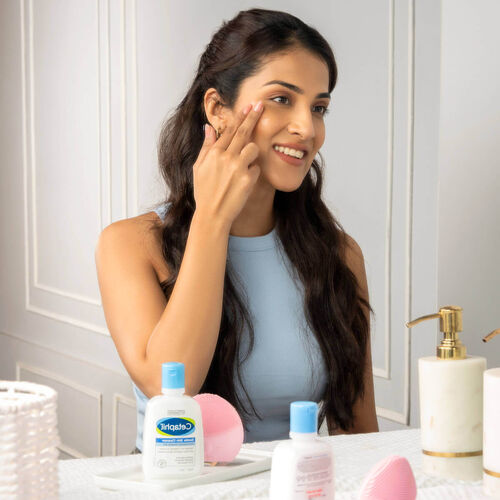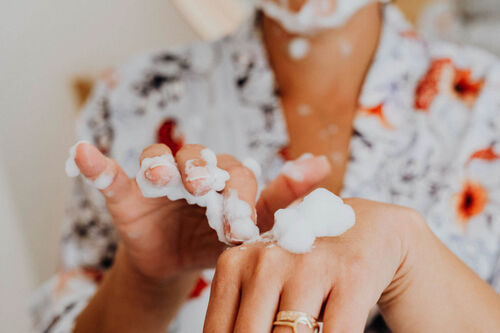The Right Way to Use Cleansers: A Step-by-Step Guide
Cleansing is a crucial part of any skincare routine. Whether you want to remove dirt, excess oil, or makeup residue, choosing the right cleanser and using it correctly can make a significant difference. For those with sensitive skin, like many people between the ages of 20 and 50, dermatologist-recommended products such as Cetaphil cleansers are often ideal. In this guide, we'll walk you through how to use Cetaphil cleanser the right way for the best results, ensuring your skin stays healthy and fresh.

Understanding Cleansers
A cleanser is a skincare product that removes dirt, sweat, oil, and impurities from your skin. It plays a crucial role in keeping your skin clean and healthy by preventing clogged pores. Unlike regular soap, which can dry out the skin, a cleanser is gentle and maintains your skin's natural balance. It washes away all the unwanted particles that build up throughout the day, leaving your skin feeling fresh. Cleansing your face daily, especially before bed, is important to remove all traces of makeup, dust, and pollutants, ensuring your skin can breathe and repair itself during the night.
Types of Cleansers
Different types of cleansers are available, and it’s important to choose one based on your skin type. Let’s break down the most common ones:
Gel Cleansers
Gel cleansers are perfect for oily or acne-prone skin. These lightweight cleansers have a gel-like consistency and are designed to deep-clean pores, remove excess oil, and prevent breakouts. They leave your skin feeling refreshed without any greasy residue. If you have oily or combination skin, a gel-based cleanser like Cetaphil Oily Skin Cleanser is ideal for everyday use. It balances oil production and keeps your skin clear without over-drying it.
Foam Cleansers
Foam cleansers are light and foamy, making them great for oily and combination skin types. When applied, they create a rich lather that lifts away dirt, oil, and impurities. Foam cleansers are easy to rinse off and leave the skin feeling clean and refreshed. Cetaphil Gentle Foaming Cleanser can be a good choice if you prefer a gentle yet effective formula, especially for everyday use.

Cream Cleansers
Cream cleansers are ideal for dry and sensitive skin. They have a creamy texture that cleanses while moisturizing, ensuring your skin doesn’t feel tight or dry after washing. These cleansers are gentle and nourishing, removing dirt and makeup without stripping away natural oils. Cetaphil Gentle Skin Cleanser offers hydration and soothing properties that make it perfect for delicate or dry skin types.
Oil Cleansers
Oil cleansers attract and dissolve oil-based impurities, like makeup and sunscreen. They are perfect for dry, sensitive, or combination skin as they cleanse without disrupting the skin's moisture barrier. Oil cleansers can also help with deep cleaning while leaving the skin soft and hydrated. An oil-based product like Cetaphil Oil Skin Cleanser can benefit those looking for a gentle yet thorough cleansing routine.
Steps for How to Use Cetaphil Cleanser for Best Results
Using a cleanser isn’t just about applying it and rinsing it off. There’s a process that ensures you get the maximum benefit from your product. Here’s a step-by-step guide on how to properly use Cetaphil cleanser for best results:
Step 1: Selecting the Right Cetaphil Cleanser for Your Skin Type
Choosing the right product based on your skin’s needs is crucial. Cetaphil offers different cleansers catering to various skin types:
Oily Skin
For oily skin, it's important to use a cleanser that controls excess oil without stripping away natural moisture. Cetaphil's Oily Skin Cleanser is a great option, as it gently removes oil and dirt, unclogs pores, and prevents acne breakouts. It’s lightweight and non-greasy, leaving your skin feeling fresh without that tight or dry sensation. Use it twice daily for the best results.
Dry Skin
Dry skin requires a cleanser that hydrates while cleansing. Cetaphil’s Gentle Skin Cleanser works perfectly as it cleanses without stripping away the skin’s moisture barrier. Its creamy texture soothes dry, flaky skin, making it soft and supple after every wash. It’s non-foaming and can even be used without water, offering a gentle solution for dehydrated skin.
Combination Skin
Combination skin can be tricky, but Cetaphil offers options like their Oily Skin Cleanser, which works well for both oily and dry areas. This cleanser helps balance oil production without drying out the drier parts of your face. It effectively cleanses the oily T-zone while keeping the cheeks and other areas soft and hydrated. It’s ideal for twice-daily use.
Sensitive Skin
Sensitive skin needs extra care, and Cetaphil’s Gentle Skin Cleanser is the perfect solution. Dermatologist-recommended, this cleanser is free from fragrances and harsh chemicals, making it ideal for people with sensitivity issues. It cleanses gently while maintaining the skin’s natural barrier, ensuring no irritation or redness. Use it daily to keep your skin calm and comfortable.
Step 2: Prepping Your Skin for the Best Cleanser Application
Before applying the cleanser, start by washing your hands thoroughly to remove dirt and bacteria. Wet your face with lukewarm water to open up your pores, allowing the cleanser to penetrate deeply. This step ensures that the cleanser can work more effectively to remove dirt, oil, and impurities from your skin without causing dryness or irritation.
Step 3: Apply Cetaphil Cleanser for Optimal Results
Add a small amount of Cetaphil cleanser (about the size of a coin) to your damp face. Use gentle, circular motions to spread the product evenly. Be sure to cover all areas of your face, including the forehead, nose, cheeks, and chin. Properly applying cleanser ensures it reaches all corners, removing dirt and oil without overdrying your skin.
Step 4: Rinsing Off the Cleanser Thoroughly and Effectively
Once you've massaged the Cetaphil cleanser onto your face, it's time to rinse it off. Use lukewarm water to thoroughly remove all traces of the cleanser. Make sure there’s no product left behind, especially around the hairline and jawline. Proper rinsing prevents buildup, which can clog pores and lead to breakouts, ensuring a fresh and clean finish.
Step 5: Massaging the Cleanser Into Your Skin
For the best way to use a cleanser, gently massage it onto your skin using your fingertips in circular motions. Start from the center of your face and work outward. This boosts circulation and helps the product penetrate more effectively. Avoid scrubbing harshly, especially if you have sensitive skin, as this can cause irritation and redness.
Step 6: Patting Your Skin Dry
After rinsing, use a soft, clean towel to pat your skin dry—don't rub, as it can irritate your skin. Gently press the towel on your face, allowing it to absorb the water without disrupting your skin's natural moisture balance. This step is especially important for sensitive and dry skin types to avoid unnecessary friction or damage.
Frequency of Cleansing (Morning vs Evening)
Cleansing your face twice a day—morning and evening—is generally the best routine for healthy skin. In the morning, cleansing helps remove excess oil produced while you sleep and preps your skin for the day. It's important to start your day with a fresh, clean face, especially if you use skincare products or sunscreen.
Cleansing in the evening is crucial to remove dirt, pollution, makeup, and oil buildup from the day. Skipping this step can clog pores and lead to breakouts or dull skin. For those with dry or sensitive skin, once-a-day cleansing in the evening might be sufficient, as might using a gentle cleanser like Cetaphil Gentle Skin Cleanser to maintain your skin's natural moisture balance.
Common Mistakes To Avoid When Applying Cleanser
Using a cleanser seems straightforward, but some common mistakes can impact its effectiveness. Here's what to avoid:
- Over-cleansing: Washing your face too often, especially with harsh cleansers, can damage your skin's natural barrier, leading to dryness or oil overproduction. Stick to cleansing twice a day unless you’ve been sweating a lot.
- Using hot water: Many people think hot water cleans better, but it can strip your skin of natural oils and cause dryness or irritation. Always use lukewarm water for cleansing.
- Skipping makeup removal: Cleansers may not remove all makeup, especially waterproof products. Make sure to use a separate makeup remover before using your cleanser.
- Skipping the moisturizing step: Always follow up with a moisturizer after cleansing, especially if you have dry or sensitive skin.
- Not choosing the right product for your skin type: Using a cleanser not suited for your skin type can lead to more problems. Make sure you choose the appropriate Cetaphil cleanser for your skin’s needs.
- Rubbing too hard: Applying too much pressure or scrubbing can irritate the skin and cause redness. Be gentle and use soft, circular motions to avoid damaging your skin.
Conclusion
Choosing the best way to use cleanser not only ensures your skin stays clean but also helps maintain its health in the long term. By using Cetaphil’s dermatologically tested products, you can rest assured that you’re treating your skin with the care it deserves, particularly if you have sensitive skin. Remember to follow the steps properly and avoid common mistakes for glowing healthy skin.
Shop Cetaphil cleansers now and experience the difference with dermatologist-approved skincare.
Frequently Asked Questions (FAQs)
How often should I use a cleanser?
It's best to use a cleanser twice a day—once in the morning to remove excess oil produced overnight and once in the evening to wash away dirt, makeup, and pollution. For those with sensitive or dry skin, cleansing once at night might be enough to avoid overdrying. Always use a gentle cleanser like Cetaphil to prevent irritation.
What’s the difference between gel and cream cleansers?
Gel cleansers are lightweight and ideal for oily or acne-prone skin, as they remove excess oil and deep-clean the pores. Cream cleansers, on the other hand, are rich and moisturizing, making them perfect for dry and sensitive skin. They cleanse while hydrating, preventing the skin from feeling tight or dry after washing.
Is it okay to use hot water when cleansing?
No, it's not recommended to use hot water for cleansing. Hot water can strip away the skin’s natural oils, leading to dryness and irritation. Lukewarm water is the best option as it helps to open up pores for effective cleaning without causing damage or dehydration to your skin.
Can I use a cleanser if I have sensitive skin?
If you have sensitive skin, it's essential to use a gentle, dermatologist-recommended product like Cetaphil. These cleansers are specifically formulated to cleanse without causing irritation, dryness, or redness. Always look for cleaners free from harsh chemicals, fragrances, and parabens, which can aggravate sensitive skin.
Can I use a cleanser if I have an oily skin type?
Yes, using a cleanser is crucial for oily skin. Choose a gel or foam cleanser, such as Cetaphil’s Oily Skin Cleanser, which helps to control excess oil production without over-drying the skin. Regular cleansing twice a day will help keep your skin fresh, unclog pores, and prevent breakouts caused by excess oil.













